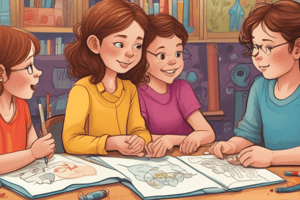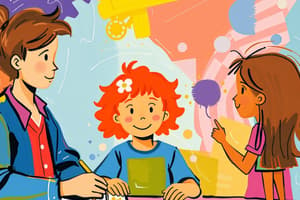Podcast
Questions and Answers
What is essential for creating a professional learning environment in early childhood education?
What is essential for creating a professional learning environment in early childhood education?
- Providing clear, respectful, and culturally sensitive interactions. (correct)
- Focusing solely on academic skills.
- Establishing a friendly rather than professional demeanor.
- Limiting communication to verbal only.
How can educators ensure that all children have equal opportunities to participate?
How can educators ensure that all children have equal opportunities to participate?
- By providing a one-size-fits-all curriculum.
- By adapting materials and activities to meet diverse needs. (correct)
- By ignoring differences in backgrounds and abilities.
- By maintaining rigid group activities.
What role does observation play in early childhood education professionalism?
What role does observation play in early childhood education professionalism?
- It is only useful for classroom management.
- It allows for creating standardized assessments for all children.
- It is unnecessary for individualized learning.
- It helps educators understand each child's strengths and needs. (correct)
What is a key element of ethical conduct in early childhood education?
What is a key element of ethical conduct in early childhood education?
What is the importance of professionalism in building relationships with families?
What is the importance of professionalism in building relationships with families?
How can educators promote lifelong learning in children?
How can educators promote lifelong learning in children?
What does an inclusive learning environment require from educators?
What does an inclusive learning environment require from educators?
How does professionalism influence collaboration among educators?
How does professionalism influence collaboration among educators?
What is a characteristic of effective communication in early childhood education?
What is a characteristic of effective communication in early childhood education?
What defines the role of ethics in early childhood education?
What defines the role of ethics in early childhood education?
What should educators focus on when designing activities for children?
What should educators focus on when designing activities for children?
What is the main goal of professionalism in early childhood education?
What is the main goal of professionalism in early childhood education?
Why is a code of ethics important in early childhood education?
Why is a code of ethics important in early childhood education?
How is trust established between educators and families?
How is trust established between educators and families?
What is a key aspect of professionalism in early childhood education?
What is a key aspect of professionalism in early childhood education?
Match the following terms to their definitions.
Match the following terms to their definitions.
Which of the following is NOT a characteristic of a positive learning environment?
Which of the following is NOT a characteristic of a positive learning environment?
Tailoring teaching approaches to meet the unique needs of each child is a key responsibility of educators.
Tailoring teaching approaches to meet the unique needs of each child is a key responsibility of educators.
What should educators reflect on to improve their practice?
What should educators reflect on to improve their practice?
Ethical conduct in early childhood education does not require confidentiality.
Ethical conduct in early childhood education does not require confidentiality.
Match the following qualities to their importance in early childhood education.
Match the following qualities to their importance in early childhood education.
Flashcards are hidden until you start studying
Study Notes
Professionalism in Early Childhood Education
- Fundamental to creating a positive learning environment that fosters children's development and success.
- Professionalism is illustrated through educators' self-presentation, communication styles, and commitment to responsibilities.
- Establishes respect and trust, essential for building strong relationships with children and families.
- Trust is developed via consistent, honest, and transparent interactions, boosting families’ confidence in care and education.
Effective Communication
- Vital for addressing diverse needs of children through clear, respectful, and culturally sensitive interactions.
- Both verbal and non-verbal communication methods enhance understanding and support.
Creating a Positive Learning Environment
- A safe, welcoming, and engaging space is crucial where children feel valued.
- Activities must be developmentally appropriate and inclusive, catering to varied learning styles and interests.
- Encourages curiosity, creativity, and critical thinking among children.
- Inclusivity ensures equal participation opportunities for all children, integrating cultural and linguistic diversity.
Individualized Learning
- Professional educators tailor approaches based on knowledge of child development and individual strengths.
- Observations and assessments guide the creation of personalized learning paths, promoting belonging and growth.
- Enhances children's confidence and motivation by making them feel understood and supported.
Collaboration and Communication
- Fosters a culture of collaboration among colleagues and families, supporting open communication and mutual support.
- Collaborative efforts promote consistency in handling positive behaviors and interactions within the learning environment.
- Involves regular meetings, sharing strategies, and family involvement to strengthen home-school connections.
Commitment to Excellence
- Professional commitment enhances educational quality and provides a foundation for lifelong learning.
- Ongoing professional development and reflection on practices keep educators informed of the latest trends and research in the field.
- Striving for excellence equips children with essential skills and confidence, nurturing them into capable learners.
Ethics in Early Childhood Education
- Upholds high standards of conduct and fosters a conducive environment for learning and development.
- Commitment to continuous learning and effective communication builds strong relationships with children, families, and colleagues.
- Ethical principles guide decision-making, focusing on children's well-being and rights while maintaining confidentiality and promoting equality.
- Ethical conduct involves intentional practice and awareness of personal values versus professional responsibilities.
Integrating Professionalism and Ethics
- Helps educators navigate challenges in early childhood education with integrity and compassion.
- Provides a reflective framework for informed decision-making and meaningful engagement with families and communities.
- Supports the holistic development of every child, reinforcing the importance of professionalism and ethics in education.
Professionalism in Early Childhood Education
- Fundamental to creating a positive learning environment that fosters children's development and success.
- Professionalism is illustrated through educators' self-presentation, communication styles, and commitment to responsibilities.
- Establishes respect and trust, essential for building strong relationships with children and families.
- Trust is developed via consistent, honest, and transparent interactions, boosting families’ confidence in care and education.
Effective Communication
- Vital for addressing diverse needs of children through clear, respectful, and culturally sensitive interactions.
- Both verbal and non-verbal communication methods enhance understanding and support.
Creating a Positive Learning Environment
- A safe, welcoming, and engaging space is crucial where children feel valued.
- Activities must be developmentally appropriate and inclusive, catering to varied learning styles and interests.
- Encourages curiosity, creativity, and critical thinking among children.
- Inclusivity ensures equal participation opportunities for all children, integrating cultural and linguistic diversity.
Individualized Learning
- Professional educators tailor approaches based on knowledge of child development and individual strengths.
- Observations and assessments guide the creation of personalized learning paths, promoting belonging and growth.
- Enhances children's confidence and motivation by making them feel understood and supported.
Collaboration and Communication
- Fosters a culture of collaboration among colleagues and families, supporting open communication and mutual support.
- Collaborative efforts promote consistency in handling positive behaviors and interactions within the learning environment.
- Involves regular meetings, sharing strategies, and family involvement to strengthen home-school connections.
Commitment to Excellence
- Professional commitment enhances educational quality and provides a foundation for lifelong learning.
- Ongoing professional development and reflection on practices keep educators informed of the latest trends and research in the field.
- Striving for excellence equips children with essential skills and confidence, nurturing them into capable learners.
Ethics in Early Childhood Education
- Upholds high standards of conduct and fosters a conducive environment for learning and development.
- Commitment to continuous learning and effective communication builds strong relationships with children, families, and colleagues.
- Ethical principles guide decision-making, focusing on children's well-being and rights while maintaining confidentiality and promoting equality.
- Ethical conduct involves intentional practice and awareness of personal values versus professional responsibilities.
Integrating Professionalism and Ethics
- Helps educators navigate challenges in early childhood education with integrity and compassion.
- Provides a reflective framework for informed decision-making and meaningful engagement with families and communities.
- Supports the holistic development of every child, reinforcing the importance of professionalism and ethics in education.
Studying That Suits You
Use AI to generate personalized quizzes and flashcards to suit your learning preferences.




